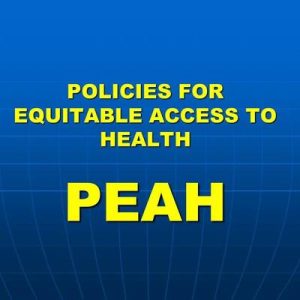IN A NUTSHELL Author's Note…PEAH engages, under One Health perspective, with the best options for use of trade and government rules related to public health first and foremost in the resource-limited settings. In so doing, while aligning with World Health Organization’s definition of Health as a state of complete physical, mental and social well-being and not merely the absence of disease or infirmity, PEAH is aware that the health of people is closely connected to the health of animals and our shared environment…

By Daniele Dionisio
PEAH – Policies for Equitable Access to Health
PEAH’s Way of Championing the Worst Off
A No-Stop Voice in the One Health Arena

An English-language platform run by Daniele Dionisio, PEAH (acronym for Policies for Equitable Access to Health) has been serving for several years now as an independent blog aligning with the scope and aims of the European Parliament Working Group on Innovation, Access to Medicines and Poverty-Related Diseases.
An observatory of challenging health issues, PEAH acts as a space open to contributions from everywhere and an internationally oriented forum for debate, sharing and denunciation of undermining threats to fair access to care and treatments from a comprehensive view encompassing the policies, strategies and practices of all involved actors.
In a nutshell, PEAH aims to face ALL health priority challenges including, though not limited to, climate and environment safeguarding, fair access to care, medicines and food, protection of disadvantaged/discriminated people and cultural diversity.
PEAH operates without any monetary grant/funding/support. Nonetheless, it benefits from world scale audience actively coming to the website, while relying to date on around ten thousand regular followers whose numbers are on the rise on daily basis. These people, largely including academics and stakeholders from a number of leading institutions and organisations worldwide, continue writing articles for PEAH, as shown by our Featuring section
Why Was PEAH Conceived?
Because any initiative for equity is to-the-point and should not be given up at a time when the effects of industry and governments’ policies on non-discriminatory access to appropriate care and treatments add to their negative impact on ecosystems as an issue of global concern in the One Health arena.
This is what is actually happening in a world where climate and environmental disruption is pressing, while more than half of the people in poor countries rely on less than $2 per day, and lifesaving medicines are under prolonged patent regimes which are further exacerbated by trade agreements and governments’ choices turning agendas into policies which protect monopolistic interests at the expense of unbiased access to key treatments.
Overall, this puts the finger in ‘the wound that will not heal’, wherein non-stop multi-sector engagement worldwide is required to pressure decision makers into “U-turn” changes implementing common measures on shared agenda. Really hard bet in these times of neoliberal globalization underpinning unfettered trade liberalization, where collusion of national-transnational corporations with their political counterparts comes as no surprise.
With the result that public health interest almost regularly succumbs to the interest of the powerful.
Against this scenario, PEAH adds itself to silver lining voices boosting towards climate, ecosystems safeguarding and more inclusive, equitable directions for care, treatments, health technologies access for all.
Main Themes
PEAH engages, under One Health perspective, with the best options for use of trade and government rules related to public health first and foremost in the resource-limited countries. In so doing, while aligning with World Health Organization’s definition of Health as a state of complete physical, mental and social well-being and not merely the absence of disease or infirmity, PEAH is aware that the health of people is closely connected to the health of animals and our shared environment. Its critical lens includes:
-the effects of current trade agreements and intellectual property (IP) standards on access to health services and appropriate, high-quality medicines.
-the opportunities offered by new financing mechanisms and innovation models for fair access to care, food and treatments and the development of medicines for diseases that disproportionately affect the resource constrained settings.
-protection of disadvantaged/discriminated people and cultural diversity.
-reliable ways for better coherence and collaboration among stakeholders supposed to streamline access to health priorities.
-re-oriented practices and behaviours by governments, corporations and civil society toward reversing climate deterioration, where it must be kept in mind that “What is good for nonhumans and the Earth is virtually always in the best interests of humans, given the profound interdependence of all life.”
PEAH Structure
While publishing online original articles, PEAH underpins, revives and supports any initiatives and news from humanitarian field realities in a vast, international network.
To this effect, PEAH is organized into pages and columns constantly enriched with new content. They include, though are not limited to:
–Recent posts main page: original contributions and interviews
–Weekly News Flash column: health breaking news from everywhere
–Featuring column: live list in cronological order of what posted in the main page
–Blogroll column: one click explorable links to worldwide health centered websites
–In the Public Eye: a dedicated page to PEAH quotations from everywhere
Want to Contribute an Article to PEAH?
Spontaneous submissions in the form of articles, editorials and blogs are welcome. Pieces dealing with the priorities and challenges first and foremost in the resource-limited countries, including for fair access to high-quality health treatments and care, food, and for climate/environment safeguarding would be to the point: https://www.peah.it/spontaneous-article-submissions/
No editorial requirements or limitations as regards the length and structure of the articles, and the authors are invited to incorporate references as hyperlinks directly in the text.
Upon editor’s acceptance, manuscripts will enjoy free of charge, immediate online publication for circulation throughout PEAH network and sharing on social media platforms.
Authors are free to re-publish their pieces from PEAH, provided that PEAH quotation as the original source is included together with proper web-link.
If you wish to contribute, please submit to PEAH editor at danieledionisio1@gmail.com
A Few Examples
Interested readers are invited to access PEAH website and gain direct insight into the still underway critical issues for which PEAH has been acting and continues to serve as spokesperson in terms of denunciation and debate, in unison with the authors of individual contributions. But a few examples below:
Ethical Equity Redistribution/Contribution to Global Good by Juan Garay
WHO and Immigrant Health Workers: A Social Justice Perspective by Raymond Saner
Creating Aspirations in Aspiration District Yadgir, a Pre-Industrial Pocket of India by Veena S Rao
Holistic Systemic Change to Care for All Life on Earth by George Lueddeke
Bridging the Gap: Elevating Preventive Healthcare in Pakistan’s Health Agenda by Muhammad Noman
Interview: Liele Netsanet, Gainhopes organization, Ethiopia by Daniele Dionisio
Unmasking Gender Inequities in Health: Research Findings & A Roadmap to Gender-Equitable UHC by Philip J Gover
GER-Rwanda 2022-2024 Activity Report by Innocent Musore
Interview: Joan Kembabazi, Gufasha Girls Foundation, Uganda by Daniele Dionisio
Lessons From Ecuador: A One Health Perspective by Laura H. Kahn
The Pandemic as Tipping Point, Revisited by Ted Schrecker
WHO, the Right to Health and the Climate Crisis – What Advice for the ICJ? by David Patterson
Effective Reduction of Antibiotic Use in Dairy Farming through Ethnovet Medicine as Part of an Integrated Livestock Health Approach by Katrien van’t Hooft
Corona-Policy-Chaos and Health for All by Judith Richter
Bundle of Joy or Cause for Shame? Just What Mothers in the Kenyan Informal Settlements Face. A Tale of Inequalities in Maternal Health Service Delivery by Reagun Andera Odhiambo
Economic Growth, Accessibility, and COVID-19: a Policy Analysis Examining a Decade of Greater Alcohol Liberalization in Ontario by Yipeng Ge, Elspeth McTavish, Rohit Vijh, Lawrence Loh
Covid-19 Vaccines – On Fairness and Distribution by Iris Borowy

